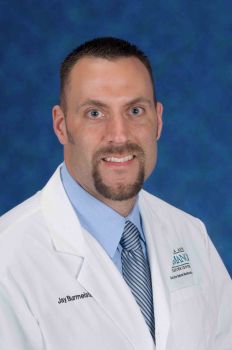M.S. in Medical Physics
GENERAL INFO

Jay Burmeister, PhD, DABR, FAAPM
Director, Medical Physics Graduate Program
Wayne State University School of Medicine
The curriculum consists of 35 graduate course credits, including required and elective coursework, and a 3-credit Essay project. Essays can represent original research, developmental projects, or literature reviews. An Exit Examination is also required and all students will be encouraged to complete a (non-credit) clinical internship.
PREREQUISITES
All prerequisites (or equivalents) should be completed BEFORE commencing the Master's program.
- Graduate Record Examination: General Test
- Mathematics: At least three semesters of calculus and elementary differential equations.
- Physics: Bachelor's degree in Physics, or Bachelor's degree in an appropriate science or engineering that includes at least three additional upper-level physics courses (e.g., electricity and magnetism, classical mechanics, modern physics, quantum mechanics, atomic and nuclear physics, thermodynamics, etc.)
REQUIRED COURSEWORK
Total of 31 credit hours
| ROC 5010 | Introduction to Radiological Physics (4 credits) |
| ROC 7000 | Imaging Physics I (4 credits) |
| ROC 7010 | Imaging Physics II: Nuclear Medicine (2 credits) |
| ROC 7020 | Physics of Radiation Therapy (3 credits) |
| ROC 7040 | Radiation Dosimetry (2 credits) |
| ROC 7160 | Advanced Topics in Medical Physics (2 credits) |
| ROC 7060 | Applied Radiobiology (2 credits) |
| ROC 7070 | Radiation Safety (2 credits) |
| ROC 7080 | Therapy Physics Lab (2 credits) |
| ROC 7130 | Nuclear Medicine Physics Lab (2 credits) |
| ROC 7890 | Seminar (1 credit) |
| ROC 7999 | Essay Direction (3 credits) |
| ROC 7150 | Radiation Oncology Anatomy (2 credits) |
ELECTIVE COURSES
Therapy specialists (at least 4 credit hours):
| ROC 7110 | Treatment Planning (2 credits) |
| ROC 7120 | Radionuclide Therapy (2 credits) |
Diagnostic specialists (at least 4 credit hours):
| BME 7710 | Magnetic Resonance Imaging (4 credits) |
CLINICAL INTERNSHIP PROGRAM
The purpose of the clinical internship is to provide practical experience so that graduates will be immediately useful upon employment. Interns will gain clinical experience under the direction of program faculty at the Karmanos Cancer Center, along with potentially other area facilities. An internship covering IMRT quality assurance will also be offered through Karmanos Cancer Center. Arrangements will be made during the fall term. Additional clinical opportunities may be secured by the individual students through faculty mentors.
TRANSFER OF CREDIT
Up to 12 credits may be transferred in from another accredited university to meet the didactic requirements of the MS degree.